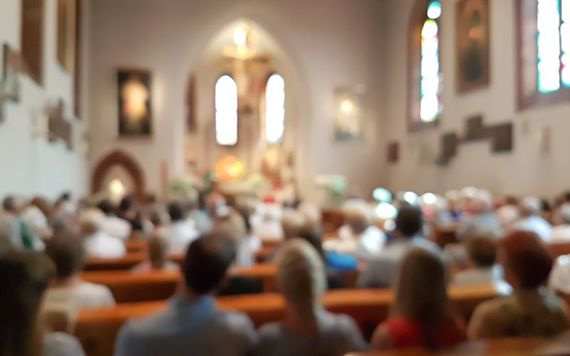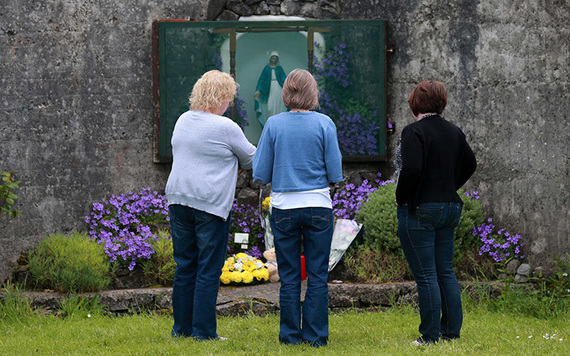For decades Irish women were harshly judged by their own Catholic Church and for many their revenge was to judge others harshly themselves. Ireland become stuck in a cycle of abuse.
On Saturday morning, the day after the historic referendum to repeal the Eight Amendment in the Republic of Ireland, I woke up and thought about some Irish women I had known.
These women had been the type who had worn head scarves to mass in the old manner long after it changed. They would put on their best twin sets and pearls and sit in the pews and look irreproachably respectable at all times, holding the moral line and policing others, all of their lives.
Read more: Priests say Catholics who voted Yes on abortion can not be wed in Church
Some would have called these women victims of history, but I knew better. Victim is not the right word for a person who has willingly collaborated with a system that has oppressed them (and all other women). Casualty is a more accurate locution, although they would have been offended by the charge.
Most of them have passed on now, but not all. I reflected on how their entire lives had been shaped from first communion to last rites, by a theocratic Irish society and culture, a society and culture that had tottered perilously for three and a half decades thanks to its own hubris and had now finally collapsed.

As I was thinking of these women I reflected on the suffocating Ireland that they had stood sentry over. The one where unmarried mothers and ungovernable young women were sent to the Magdalene Laundries, decade after decade. The very names of these places passed a judgment on them, and in these places their identities, as well as their infants, were literally taken from them, never to be seen again.
Then I thought of poor Ann Lovett giving birth in a grotto, under a statue of Our Lady, in winter 1984. I've thought about her so much over the years because we were almost the same age when she died. It was the era of Duran Duran and Wham and Culture Club and Frankie Goes to Hollywood. Her death shocked me, changed me, changed what I thought about Ireland, about what kind of people we were.

Women pay their respects at the grotto by the site of where 796 children from the Bon Secour Mother and Child home are believed to be buried.
I realized on Saturday morning that I have never gotten over it. Any of it. If someone's teenage daughter could die alone in those lonely conditions then anyone's could. We weren't looking after them. Instead we were shaming and silencing them. We were casting them out like Eve's from the Garden of Ireland.
I thought about all the young women sitting alone on ferries to England. I made that voyage once and it took half a day by boat and train to reach London, an ordeal I vowed never to repeat. But imagine if I had taken it in distressed circumstances? Feeling the full weight of my isolation and lack of support? It made me understand a little of the cruelty that we had asked women to endure without complaint.
Then I thought about women waiting anxiously at an Aer Lingus departure gate at Dublin airport. Another flight to a foreign country because their own had washed its hands of them. What a lifelong, unforgettable betrayal that must have felt like. Just the certain knowledge that you had transgressed so far your nation would no longer help you.
Read more: Pope Francis believes Ireland and Europe lost to the Catholic Church
Then I thought about the confession boxes. The places where women who had lived unblemished, unremarkable lives nevertheless unburdened themselves to a man, who's job it was to judge and forgive them for falling short. How could they not fall short if the role models they were presented with were Mary the Virgin Mother or Mary the Magdalene? Wasn't there a more realistic option for women or was undermining their every effort the whole point?
Then I thought about Tuam. I had visited it during the height of the septic tanks scandal. I didn't know the town but within ten minutes of arriving in its center I had found my way to the site of the former Mother and Baby Home where 796 unrecorded infants had been hastily interred. I didn't ask anyone for directions. I didn't need to.

Looking around I simply asked myself where I would have built an institution to hide people and I just walked toward it. I was there within minutes.
You can't subject people to abuses on that scale for generations and think there will be no consequences. You can't possibly believe that it will be allowed to continue indefinitely, year after year, without push back.
There were scenes of jubilation at Dublin castle at the weekend. I understood them, because they were the expression of women who had been silenced all their lives finding their voices. But it's not how I felt on Saturday morning. To my surprise, I wept.
My heart felt like it was breaking. I wept thinking about the ordinary women I had known who had been robbed, who had given their lives to a system that offered salvation as it stripped them of their autonomy, that traded contentment in this life for the promise of a world to come.
All their lives they had been judged relentlessly by their own church and their only revenge was to judge others relentlessly themselves. It was an abuse cycle. They had lived hard lives because of that cycle. They had made life hard for others because of it.
Most of them were already gone. They hadn't lived to see the curtain raised and the wizards feet revealed at last. Perhaps, in the end, that was the only blessing.




Comments